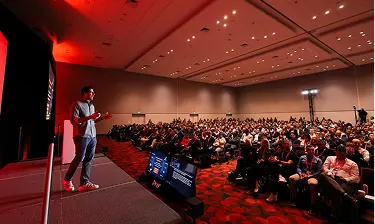REGISTRATION NOW OPEN
Join thousands of your peers for 800+ sessions, keynotes and training at the world’s largest data, analytics and AI conference.
Featured speakers
Data + AI Summit speakers include leading experts, researchers and open source contributors — from Databricks and across the data and AI community.
Ali
Ghodsi
Co-founder and CEO,
Databricks
Kasey
Uhlenhuth
Director, Product Management,
Databricks
Matei
Zaharia
Original Creator of Apache Spark™ and MLflow; Chief Technologist,
Databricks
Reynold
Xin
Co-founder and Chief Architect,
Databricks
Miranda
Luna
Director, Product Management,
Databricks
Robin
Sutara
Field CDO,
Databricks
Nikita
Shamgunov
VP, Engineering,
Databricks
Arsalan
Tavakoli
Co-founder and SVP, Field Engineering ,
Databricks
PREVIEW OUR SESSIONS
Choose from 800+ sessions spanning the full spectrum of data intelligence, from data engineering, warehousing and governance to analytics, applications, agents and AI.
AI Agents for the Frontline: 7-Eleven’s GenAI Maintenance Assistant
Beyond the Trace: adidas’ Agent Digital Twin for Governance, Cost and ROI
Building the Commercial Lakehouse: AI-Driven, Open and Interoperable
Data Governance at Scale with ABAC at Atlassian
Why Attend
Join thousands of data leaders, engineers, scientists and architects to explore the convergence of data and AI and the future of data intelligent apps and agents.

learn
Discover the Latest Technologies
Explore the latest advances in Delta Lake, Apache Iceberg™, Apache Spark™, MLflow, Unity Catalog, Lakeflow, Databricks Apps, Databricks SQL and Lakebase — alongside agentic AI systems, AI/BI and open source frameworks such as DSPy, LangChain, PyTorch, dbt and Trino.

NETWORK
Make Meaningful Connections
Interact with thousands of your peers from the data and AI community, and grow your professional network through social meetups, the Expo and exclusive event parties.

LEVEL UP YOUR SKILLS
Access Training and Certification
Sharpen your expertise with instructor-led, half-day training. Boost your credentials with our hands-on, lab-based format and get onsite certifications.
Pricing
Government, military, education and nonprofit attendees are eligible for early-bird pricing beyond April 30.
$947.50
Grab the most affordable full conference pass while it lasts.
$1,895
Sponsors
Data + AI Summit couldn’t happen without our awesome sponsors. Interested in sponsoring? Reach out to our Sponsorship Management team to learn about available opportunities.
